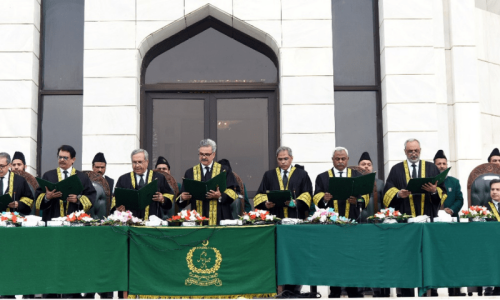ISLAMABAD: Both the EU and the US characterise mass data retention as “mass surveillance”, and the former has already struck down laws that called for massive amounts of user data to be retained by internet service providers or other entities.
Matthew Rice from Privacy International, a UK-based charity, made these remarks on Thursday during ‘The Right to Privacy in the Digital Age’, a conference hosted by the Digital Rights Foundation (DRF). He was referring to the stipulations with the new cybercrime bill that called for storing massive amounts of user data.
Mr Rice said he believed that the Prevention of Electronic Crimes Bill (PECB) – the proposed cybercrime law that is to be laid before parliament soon – should be opposed since its provisions were not well defined.
“The law allows data retention by investigating agencies for as long as a year. It authorises them to share citizens’ data and information with other countries without judicial oversight,” he said.
Mr Rice was not alone in advocating opposition to the PECB. PPP Senator Sherry Rehman and ANP leader Bushra Gohar also said that they would oppose efforts to bulldoze the bill through parliament.
Ms Rehman specifically said that she would stand in the way of the cybercrime bill in its current form.
Critics of the PECB argue that the law gives unbridled powers to investigation authorities and chokes civil liberties.
Appreciating civil society efforts to raise bringing literacy on the issue, Ms Rehman said, “We are not clear about the intent of the [government]. The law enriches government departments with excessive power and that can be problematic. The bill requires intense literacy-building on the subject.”
According to the senator, in its present form, the bill could have serious problems with definitions and implementation, as well as framing of rules.
Supporting her argument with anecdotes, Ms Gohar explained that Pakistan had become an overly police state. “The easiest thing to do is control people instead of going after the real threats to their lives,” she said.
Participants also expressed fears that provisions in the PECB could be manipulated by law enforcement agencies. Senator Rehman found it disturbing that the FIA was “abusing” the provisions of the Electronic Transaction Ordinance 2002 (ETO), made during the military rule of General Pervez Musharraf, in order to fight cyber crime.
ISPAK spokesperson Wahajus Siraj said the bill empowered the PTA to block websites they thought were objectionable, infringing upon rights of the people to access to information.
“The bill criminalizes innocent gestures. Data retention take away the people’s right to express themselves,” he said.
Published in Dawn, November 27th, 2015













































